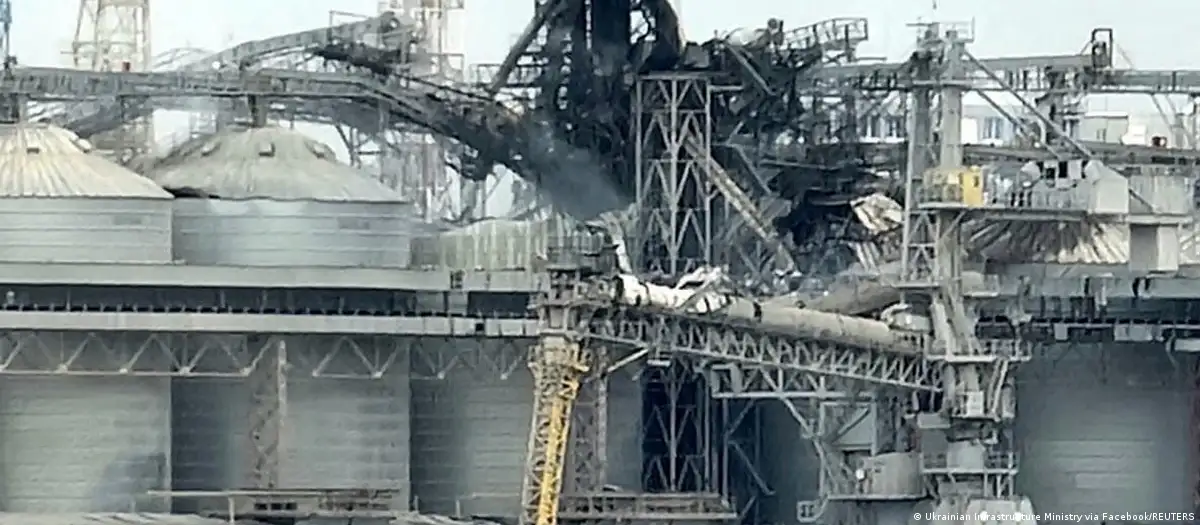Putin accused the West of “blackmail” and listed demands for Russian food and fertilizer exports. Ships on the Black Sea route from 0:00 this Thursday will be treated as enemies, the Kremlin announced.
(DW) Following the bombing of a bridge linking Russia to Crimea on Monday (17/07), the Kremlin announced its withdrawal from the agreement to allow Ukrainian grain to pass through the Black Sea, and then launched a series of air strikes against Ukrainian port infrastructure in the cities of Odessa and Mikolaiv in the early hours of Tuesday as “revenge” – in the words of Kremlin emissaries.
The attacks – “hellish” in the words of Ukrainian officials – continued through Wednesday and reportedly destroyed 60,000 tons of grain, warehouses and port infrastructure, damaged residential areas and left at least 12 civilians injured.
Ukrainian Agriculture Minister Mykola Solskyi said a “considerable” part of the export infrastructure was inoperable.
On Wednesday, 2,200 residents of Crimea, Ukrainian territory under Russian occupation, had to be evacuated after an attack on a Moscow-operated ammunition depot.
The Russian Defense Ministry said any vessel heading for Ukrainian ports from 0:00 on Thursday (Moscow time) would be treated as a potential supplier of military equipment and countries under whose flag they sail will therefore be considered party to the conflict.
In backing out of the deal in force since July last year, Russian President Vladimir Putin accused the West of perverting the “humanitarian essence” of the treaty for its own benefit, using it as an instrument of “blackmail” and enrichment of “transnational corporations and speculators”.
“Instead of helping countries really in need, [the West] used the grain deal for political blackmail,” Putin said.
Ukrainian government chief of staff Andriy Yermak hit back by saying the withdrawal from the deal and the attack on Odessa – the worst in 17 months – prove that Russia “needs hunger and problems in the countries of the Global South. They want to create a refugee crisis for the West.”
Russia wants to negotiate resumption of agreement
The Russian leader complained about the disregard of conditions that would have been agreed in parallel to the grain agreement for the benefit of his country, and signaled willingness to resume “immediately” if they are met: (i) the readmission of the Rural Bank of Russia (Rosselkhozbank) to the SWIFT payment system; (ii) the resumption of exports to Russia of agricultural machinery and spare parts; (iii) an end to restrictions on the insurance of Russian vessels and cargo; (iv) access of Russian ships to ports; and (v) the unblocking of accounts of Russian fertilizer companies.
Western countries reacted by saying that Russia already has a free pass to export food and accused Moscow of trying to circumvent financial sanctions.
Impacts of the deal’s suspension
The Black Sea agreement was brokered by the United Nations (UN) and Turkey last year in response to the global food crisis that emerged in the wake of the pandemic, but which ended up aggravated by the blockade of Ukrainian ports after the invasion of Ukraine – the Black Sea is the only sea route available to the country.
The initiative contributed to the fall and stabilization of food prices. More than 30 million tons of grain and other food products were exported by May 2023 thanks to the agreement.
The poorest countries received about 65% of the wheat, while corn was exported almost equally to developed and developing countries. In March, however, several media outlets reported that less and less grain was being shipped from Ukraine.
Total food exports made possible by the deal fell by about three-quarters in May compared with October last year – a phenomenon attributed in part to the risks of the route, but also to strict regulations.
The UN – which Russia has given three months to meet the conditions – has warned that suspending the deal is likely to drive up prices and increase hunger around the world, especially impacting poorer nations. A similar message came from the International Monetary Fund.
German Foreign Minister Annalena Baerbock reacted to the Russian bombings by accusing Putin of targeting the poorest, who would be deprived of Ukrainian food.
The closure of the Black Sea route has also triggered reactions from neighboring European countries, which are calling on the European Union to ban Ukrainian imports for fear of being flooded with cheap grain.
On Tuesday, the United States announced 250 million in support for farmers to help them with alternative export routes – Ukraine has already announced a temporary alternative route through Romania.
ra (AP, AFP, Reuters, ots) *** Translated by the DEFCONPress FYI Team ***
